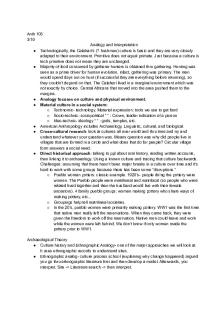Types of Affirmation, Negation and Analogy PDF

| Title | Types of Affirmation, Negation and Analogy |
|---|---|
| Course | The Problem Of God |
| Institution | Georgetown University |
| Pages | 2 |
| File Size | 90.8 KB |
| File Type | |
| Total Downloads | 30 |
| Total Views | 124 |
Summary
Instr: Tarmo Toom...
Description
Affirmation, the types of negation, and analogy Kataphaticism, via positiva
Apophaticism, via negativa
Kataphaticism attempts to bring God down in a way such that we can speak about God. It accepts the positive predication of God despite the inadequacy of that predication. This is achieved by deploying all the resources of human language in the effort to express at least something about God.
Apophaticism is a negative predication which denies the adequacy of all the words and names for God. This is based on the idea that whatever we can say about God is inherently limited due to the nature of a finite language and an infinite God – God is always more than what we can say.
God is good, God is omnibenevolent, God is allknowing.
God is not a physical being, God is not God, God is not the ocean.
Privation (steresis)
Aphaeresis
“Dionysian apophasis”
Hyperphaticism, superlative predication
Analogy
Privation designates the absence of a quality or an attribute which is normally present.
Aphaeresis is an abstract nonprivative negation, a special kind of negation, which does not necessarily strip the subject of any any of it’s proper attributes
Dionysian Apophasis negates predicating the subject all together, because the subject (God) is simply beyond any predication. Dionysian Apophasis acknowledges the bankruptcy of human language as it talks about God, using contradiction to express something inexpressible.
Hpyerphaticism combines kataphatic discourse with the idea that God is beyond language. Hyperphaticism emphasizes God’s beyondness to distinguish the difference between the creator and the creation – whatever we say about God, God is always more and beyond.
Analogy employs a common term to designate realities that are both similar and dissimilar with regards to God in order to both affirm God’s beyondness and the cognitive content of theological discourse. Analogy goes beyond just making the point that God is unknown and emphasizes the simultaneous likeness and unlikeness between created and creator.
God lacks knowledge, God is dead, God is hateful.
God does not remember our trespasses, God is not loving to those who shun God.
God is neither being nor nonbeing, God is transcendent and tangible, God knows everything and knows nothing.
God is hyper worm, hyper breeze, hyper clouds; God is beyond anything God has created; God is transcendent
God is gracious (in the way appropriate to God – supremely gracious), God is love, God is intelligent, God is benevolent (all in a supreme, anological way)...
Similar Free PDFs

Types of groups and leadership
- 13 Pages

Sample Affirmation- Letter
- 4 Pages

Freud-Negation Discussion Notes
- 1 Pages

Herbert Spencer- Organic Analogy
- 5 Pages

Donald Hall’s “Affirmation”
- 1 Pages

Different Types of Succulents and Cactus
- 136 Pages
Popular Institutions
- Tinajero National High School - Annex
- Politeknik Caltex Riau
- Yokohama City University
- SGT University
- University of Al-Qadisiyah
- Divine Word College of Vigan
- Techniek College Rotterdam
- Universidade de Santiago
- Universiti Teknologi MARA Cawangan Johor Kampus Pasir Gudang
- Poltekkes Kemenkes Yogyakarta
- Baguio City National High School
- Colegio san marcos
- preparatoria uno
- Centro de Bachillerato Tecnológico Industrial y de Servicios No. 107
- Dalian Maritime University
- Quang Trung Secondary School
- Colegio Tecnológico en Informática
- Corporación Regional de Educación Superior
- Grupo CEDVA
- Dar Al Uloom University
- Centro de Estudios Preuniversitarios de la Universidad Nacional de Ingeniería
- 上智大学
- Aakash International School, Nuna Majara
- San Felipe Neri Catholic School
- Kang Chiao International School - New Taipei City
- Misamis Occidental National High School
- Institución Educativa Escuela Normal Juan Ladrilleros
- Kolehiyo ng Pantukan
- Batanes State College
- Instituto Continental
- Sekolah Menengah Kejuruan Kesehatan Kaltara (Tarakan)
- Colegio de La Inmaculada Concepcion - Cebu









